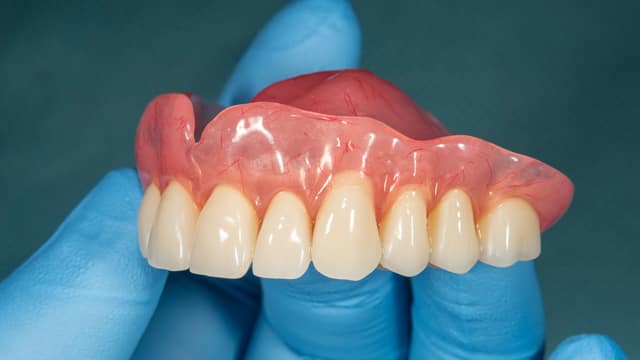Did you know that, according to the American College of Prosthodontists, 36 million Americans do not have any teeth? Of this group, 90% have dentures! That's a statistic that should put your mind at ease - toothlessness, also known as edentulism, is much more common than most people realize.
Perhaps you've committed yourself to dentures. But you've found out from your dental professional that your mouth needs an adjustment period before getting your permanent dentures. This may come as a surprise, and you may wonder, "what are temporary dentures?" Temporary dentures are also called immediate dentures. They're a set of temporary false teeth that your dental professional fits into your mouth immediately after removing your natural teeth.
Fitting a Temporary Denture
In a separate visit before your tooth extraction, your dental professional will get the necessary preparations for your temporary dentures. This includes taking a bite impression, noting your teeth shade, size, and shape, as well as taking measurements of your upper and lower jaw. Your temporary dentures will be created before your tooth extraction appointment, so they'll be ready for insertion into your mouth right after tooth extraction.
Note that because your mouth and gums have not had the chance to heal yet, this may not be a one-appointment procedure. Temporary dentures often need refitting over the following weeks and months.
How Are Temporary Dentures Made?
Did you know that both immediate and permanent dentures are custom-made in a dental laboratory from impressions taken of your mouth? But temporary denture measurements take into account the shape of your existing natural teeth. Your dental professional will also assess the shape of your lips, gums, and face to create the perfect fit. Temporary dentures are made from a range of materials, most often resins.
Cleaning and Care
Temporary dentures are removable. Food particles and plaque can build on them and leave stains. This is a common issue with dental appliances and takes daily upkeep. It's recommended to brush your dentures once per day and soak them overnight. Let's go over how to clean your temporary dentures:
- Hold them over a towel or basin half-filled with water to avoid breakage in the case of dropping them.
- Use a soft-bristled toothbrush, non-abrasive denture cleanser, and water.
- Note that toothpaste may scratch your dentures, so don't use it to clean them. Avoid hot water and solutions containing bleach, as they can damage the denture.
Ask your dental professional for guidance on how to soak your dentures overnight. Make sure to rinse your dentures thoroughly before returning them to your mouth. You should also continue good oral hygiene by cleaning your mouth, tongue, and gums in the morning before inserting your dentures, so your whole smile is fresh and ready for the day!
Temporary Denture Final Steps
Temporary dentures can save you from the aesthetic concerns and inconveniences of living without teeth. But they do take some getting used to. According to the Cleveland Clinic, after your tooth extraction, the bones within your mouth will naturally change shape as your mouth adjusts. This means that temporary dentures can become loose and uncomfortable.
If your dentures are loose, your dental professional may recommend dental adhesive as a temporary solution. As noted above, you may need additional visits to your dental professional before you receive your permanent, perfectly fitting denture.
Losing your natural teeth is a sensitive experience. It's normal to wonder about what your new teeth will look like and what the process of getting them is like! After tooth removal, temporary dentures can boost your confidence and ease you into the process of living with replacement teeth. By bridging the gap until your permanent dentures are ready, immediate dentures ensure you never have to go a day without teeth. Speak with your dental professional to learn more about dentures and the different options available to you.
This article is intended to promote understanding of and knowledge about general oral health topics. It is not intended to be a substitute for professional advice, diagnosis or treatment. Always seek the advice of your dentist or other qualified healthcare provider with any questions you may have regarding a medical condition or treatment.
ORAL HEALTH QUIZ
What's behind your smile?
Take our Oral Health assessment to get the most from your oral care routine
ORAL HEALTH QUIZ
What's behind your smile?
Take our Oral Health assessment to get the most from your oral care routine















